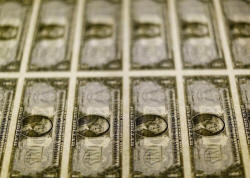|
Bias still toward
stronger U.S. dollar, but gains petering out: Reuters
Poll
 Send a link to a friend
Send a link to a friend
 [October 06, 2016]
By Rahul Karunakar [October 06, 2016]
By Rahul Karunakar
(Reuters) -
The
dollar is likely to rise a bit further, but a tame U.S. rate hike
outlook at a time of waning firepower from those global central banks
still easing policy will limit its gains, according to a Reuters poll of
foreign exchange strategists.
The Fed is still poised to pull the trigger in December, but its
lingering hesitation in delivering even one rate hike this year after
suggesting initially that four were in the pipeline has pushed the
dollar down over 2 percent so far in 2016.
"Even though the Fed is likely to normalize rates further by hiking in
December...markets should remain skeptical about the speed and the
aggressiveness of its tightening cycle over the longer-term," said David
Forrester, FX strategist at CA-CIB.
"In addition, the ECB and the BoJ are running out of options to ease
aggressively further. Taken as a whole, the G10 central bank backdrop
could reduce the positive impact on U.S. dollar from any future Fed
tightening."
Forecasts for the dollar to rise further against major currencies have
been whittled away in the run-up to the U.S. presidential elections next
month, but a majority of analysts still expect it to edge higher.

The latest positioning data from the U.S. Commodity Futures Trading
Commission showed currency speculators have increased outright bullish
bets for the U.S. dollar to the highest in six weeks at the expense of
the euro.
But the latest Reuters poll of 65 currency strategists is the third
consecutive survey that forecasters have bumped up their euro <EUR=>
calls slightly.
The consensus is for the single currency, which is up around 3 percent
this year, to weaken against the dollar to $1.09 over the coming 12
months from $1.12 on Thursday.
By the end 2016, the euro is also expected to be higher than where it
started the year, marking the first calendar year of gains for the
currency since 2013. That comes despite the European Central Bank's
extraordinary stimulus measures.
There is a clear sense now among analysts, traders and investors that
the potency of further monetary easing from major central banks is on
the wane.
Indeed, while the Bank of Japan rebooted its policy framework last month
by introducing a target for 10-year JGB yields of around zero percent,
forecasts in the latest poll are for a stronger yen than predicted in
January.
[to top of second column] |

United States one dollar bills are seen on a light table at the
Bureau of Engraving and Printing in Washington November 14, 2014.
REUTERS/Gary Cameron/File Photo

Then,
analysts were calling for the yen to fall against the dollar to 125 in 12
months. Now they are expecting it to weaken to 105.0 from 103.6 on Thursday. The
yen is up almost 14 percent this year.
Meanwhile, the battered pound is expected to tumble to new multi-decade lows in
the coming months on concerns that Britain's exit from the European Union could
get messy. [GBP/POLL]
Prime
Minister Theresa May said on Sunday Article 50 of the Lisbon Treaty - which
would formally begin the two-year countdown to Brexit - would be triggered by
the end of March, pushing the British pound <GBP=> to below $1.27 on Wednesday
for the first time in over three decades.
The latest poll showed sterling would fall as low as $1.24 in the run-up to
that.
"I'm slightly surprised the pound hasn't bounced from its fall ... but not
surprised enough to prevent me being bearish long-term. To be fair, absolutely
no-one is going to change their view of the UK economy, sterling or the wider
implications of 'Brexit' until there are mountains of evidence about the
economic impact," wrote Kit Juckes, global head of FX strategy at Societe
Generale.
(For other stories from the FX poll:)
(Additional reporting by Sumanta Dey and Hari Kishan; Polling by Krishna Eluri
and Anu Bararia; Editing by Ross Finley and John Stonestreet)
[© 2016 Thomson Reuters. All rights
reserved.] Copyright 2016 Reuters. All rights reserved. This material may not be published,
broadcast, rewritten or redistributed.

 |